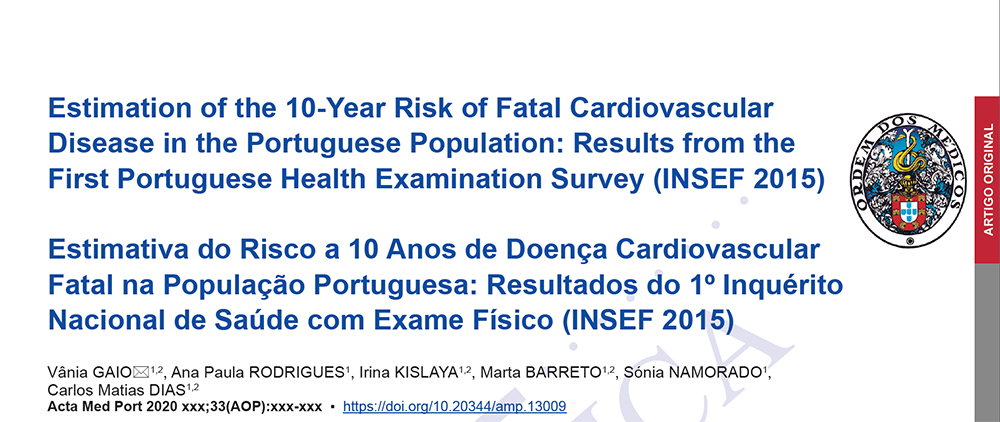SOCIAL MEDIA
Portuguese Medical Association's Scientific Journal

Introduction: Cardiovascular disease is the leading cause of morbidity and mortality in Portugal and globally. Cardiovascular risk algorithms, namely the SCORE (Systematic Coronary Risk Evaluation), are recommended in the context of cardiovascular disease prevention. Our aim is to estimate and characterize the cardiovascular risk of the Portuguese population aged between 40 and 65 years old, in 2015, using the SCORE algorithm.
Material and Methods: This study was performed on a subsample of the first Portuguese National Health Examination Survey - INSEF, including all participants between 40 and 65 years old with available data on sex, age, smoking status, total cholesterol and systolic blood pressure (n = 2945). The prevalence of the cardiovascular risk categories were stratified by sex, age group, marital status, educational level, occupational activity, urbanization of living area, region and income.
Results: In 2015, about 5.1% and 11.9% of the Portuguese resident population aged between 40 and 65 years old were, respectively, at high and very high risk of having a fatal CV event in the following 10 years. The highest prevalence of very high cardiovascular risk was found in males, individuals aged 60-65 years old, married or living with someone, without any formal education or just with the 1st cycle of basic education and belonging to the less skilled category of the occupational activity (C category) in comparison with the other
corresponding groups.
Discussion: A previous national study found a similar proportion of the population at high/very high cardiovascular risk (19.5% versus 17.1%). Our study is representative of the adult Portuguese population and adopted the European Health Examination Survey procedures, which are essential for future comparisons with other European countries. Some of the limitations of this study include the possible participation bias and the non-calibration of the SCORE algorithm for the Portuguese population.
Conclusion: In 2015, a considerable proportion of the Portuguese population aged between 40 and 65 years old had a high or very high risk of developing a fatal cardiovascular event in the next 10 years. Due to the possible overestimation of the cardiovascular risk already reported in other European countries, it will be important to carry out a follow-up study to validate the adequacy of using the SCORE algorithm in the Portuguese population.